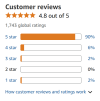I’m looking for an M.2 2280 SSD, and I’m torn between the budget-friendly Lexar EQ790 2TB M.2 2280 PCIe Gen4x4 NVMe 1.4 SSD and the Samsung 990 PRO 2TB M.2 PCIe 4.0 V-NAND MLC NVMe.
The price difference is significant, and Amazon is heavily promoting Lexar, a brand I honestly haven’t heard much about. The few negative reviews I’ve seen worry me.
Does anyone have experience with this?
I would use it as an internal SSD for my projects throughout the day—not heavy usage, but I’m concerned about reliability and potential failure.
I’d appreciate any feedback or personal experiences!
The price difference is significant, and Amazon is heavily promoting Lexar, a brand I honestly haven’t heard much about. The few negative reviews I’ve seen worry me.
Does anyone have experience with this?
I would use it as an internal SSD for my projects throughout the day—not heavy usage, but I’m concerned about reliability and potential failure.
I’d appreciate any feedback or personal experiences!

